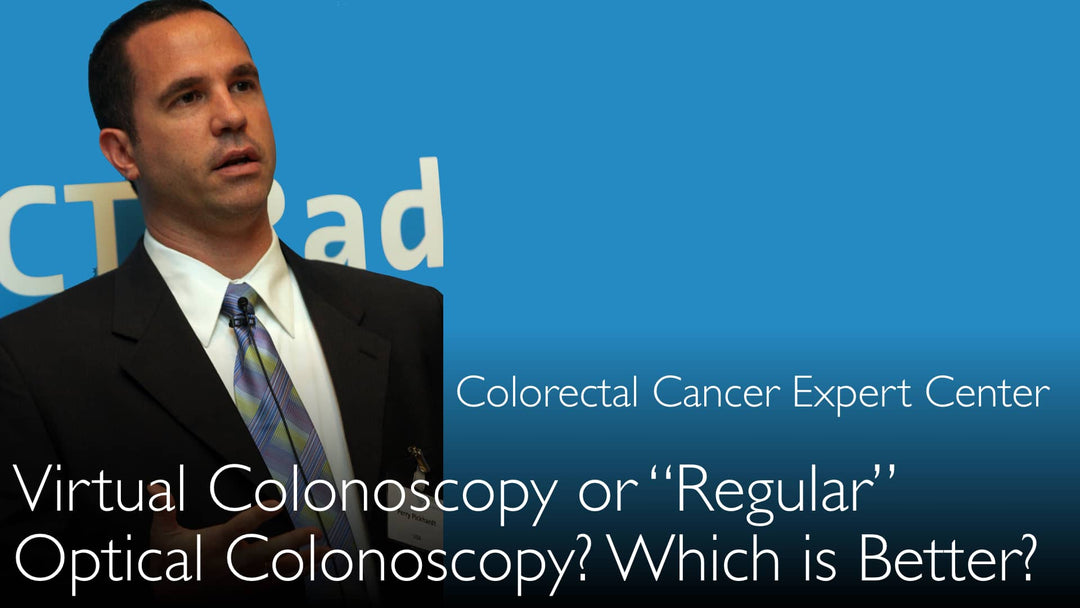Leading expert in colorectal cancer screening, Dr. Perry Pickhardt, MD, explains how virtual colonoscopy offers a highly effective and less invasive alternative to traditional optical colonoscopy. CT colonography detects advanced precancerous polyps and cancers with similar or even superior accuracy. The procedure requires no sedation or needles. Patients experience no recovery time and can immediately resume normal activities. Virtual colonoscopy also provides a valuable screening of abdominal organs for other conditions like osteoporosis and aneurysms.
Virtual Colonoscopy vs. Optical Colonoscopy: A Comprehensive Comparison for Cancer Screening
Jump To Section
- Virtual Colonoscopy Advantages
- Screening Effectiveness
- Patient Comfort & Preference
- Extracolonic Findings
- Procedure Risks
- Full Transcript
Virtual Colonoscopy Advantages
Dr. Perry Pickhardt, MD, details the significant advantages of virtual colonoscopy, also known as CT colonography. This advanced screening method is much less invasive than its optical counterpart. It requires no needles, IV medication, or sedation. Consequently, there is no recovery time needed after the procedure. Patients can immediately return to their regular daily activities and do not require a driver to take them home.
Screening Effectiveness
Virtual colonoscopy is a powerful tool for colorectal cancer prevention. Dr. Perry Pickhardt, MD, was the lead author of a seminal clinical trial published in the New England Journal of Medicine. His research demonstrated that CT colonography is just as effective as optical colonoscopy at identifying advanced neoplasms—the polyps and cancers that matter most. Dr. Perry Pickhardt, MD, notes that virtual colonoscopy might even be slightly more sensitive. It can detect right-sided colon cancers and advanced adenomas that sometimes hide behind folds during a traditional scope exam.
Patient Comfort and Preference
Patient comfort is a major differentiator between the two screening methods. Dr. Perry Pickhardt, MD, states that patients have repeatedly shown a strong preference for virtual colonoscopy. This preference holds a wide margin among individuals who have experienced both procedures. The absence of sedation for CT colonography is a key factor. Patients often remember the prolonged recovery time associated with the heavy sedation used in optical colonoscopy. The non-invasive nature of a virtual exam provides a significantly more comfortable patient experience.
Value of Extracolonic Findings
A unique benefit of virtual colonoscopy is its ability to evaluate areas outside the colon. Dr. Perry Pickhardt, MD, explains that a CT colonography exam functions as a general abdominal computed tomography screen. During the procedure, radiologists can identify other potentially serious health issues. In fact, Dr. Perry Pickhardt, MD, notes that they often find more cancers outside the colon than within it during these screenings. The scan can also screen for conditions like osteoporosis, abdominal aortic aneurysms, and fatty liver disease, adding immense value to the procedure.
Comparing Procedure Risks
The risks associated with each procedure differ greatly. Optical colonoscopy carries known risks, including bleeding, infection, and bowel perforation. Patients also face potential toxicity from sedation and dehydration from the aggressive bowel preparation laxatives. As Dr. Anton Titov, MD, highlights in the interview, virtual colonoscopy avoids all these specific risks of a traditional colonoscopy. The technology allows a doctor to "walk" through a computer simulation of the colon, providing a detailed view without the physical intrusion of a scope.
Full Transcript
Virtual colonoscopy or regular colonoscopy? Traditional optical colonoscopy? Which colorectal cancer screening method has the advantage? When is virtual colonoscopy the best cancer screening method? A leading virtual colonoscopy screening expert discusses CT colonography.
Colon cancer is the second most deadly cancer in the world. 1.5 million people get a colon cancer diagnosis every year. Yet colon cancer is completely preventable.
Dr. Anton Titov, MD: Virtual colonoscopy is able to detect colorectal cancer with similar accuracy compared with regular optical colonoscopy. It is also known as CT colonography. You are the lead author of a seminal clinical trial that compared virtual colonoscopy with regular optical colonoscopy. Your clinical trial on virtual colonoscopy was published in the world's most prestigious medical journal, the New England Journal of Medicine. What are the advantages of virtual colonoscopy?
Dr. Perry Pickhardt, MD: Over time, we have seen virtual colonoscopy to be just as effective as regular colonoscopy. It is the invasive method for identifying the polyps and cancers that matter. These are advanced neoplasms. This is, of course, very important.
CT colonography actually is much less invasive. It requires no needles, no IV medication, and no sedation. There is no recovery time. You can immediately return to your regular activities. You don't need a driver to take you home, for example.
We also evaluate a lot of areas outside of the colon during virtual colonoscopy. We find more cancers outside of the colon than within the colon. It is a general abdominal computed tomography screen. We can screen for osteoporosis and abdominal aneurysms and other processes. We can screen for fatty liver by doing virtual colonoscopy.
Dr. Anton Titov, MD: Other advantages include comfort for the patient. Patients have repeatedly shown that they prefer virtual colonoscopy over optical colonoscopy. Anyone who has had both tests, there has been a wide margin of favoring CT colonography. There is no sedation for virtual colonoscopy.
Dr. Perry Pickhardt, MD: Patients are heavily sedated for regular colonoscopy. It is the prolonged recovery time that they remember from that colonoscopy test. There are a number of advantages of virtual colonoscopy. Some of them relate to the relatively non-invasive approach. But also because virtual colonoscopy is just as effective as regular colonoscopy in identifying the lesions that matter.
CT colonography could be even more effective. It is possible that virtual colonoscopy is even more sensitive.
Dr. Anton Titov, MD: Virtual colonoscopy detects more colon cancers and precancerous lesions compared with the optical colonoscopy?
Dr. Perry Pickhardt, MD: In fact, we have found no test is perfect, of course. But the cancers that can be missed in optical colonoscopy are sometimes right-sided colon cancers or advanced adenomas. They can be hiding behind folds. But these areas are very easy for us to identify because we have really no physical constraints in terms of detection.
There is definitely a complementary nature between virtual colonoscopy and optical colonoscopy. But I believe that is true. In the end, virtual colonoscopy is probably slightly better at identifying some of these important lesions.
It is amazing how the virtualization and the use of technology helps in medicine. It really improves the ability of the people to look at previously challenging situations.
Dr. Anton Titov, MD: This is true also in many other applications outside of healthcare. Virtual colonoscopy or optical "regular colonoscopy"? Which is better? Virtual colonoscopy vs regular colonoscopy comparison provided by leading colorectal cancer screening expert.
There are many risks and complications from regular colonoscopy. Risk of bleeding, infection, bowel perforation, toxicity, and dehydration after drinking many laxatives. Virtual colonoscopy (CT colonography) avoids all these risks of regular colonoscopy.
Virtual colonoscopy lets the doctor "walk" through your colon in a computer simulation. Virtual colonoscopy, also known as CT colonography, is able to detect colorectal cancer with similar accuracy compared with regular optical colonoscopy.
Virtual colonoscopy can evaluate organs outside of the colon. CT colonography is a general abdominal screen for osteoporosis, abdominal aneurysms, and other cancers. We can screen for fatty liver too by doing virtual colonoscopy.
CT colonography has advantages over regular colonoscopy, especially the comfort for the patient. Patients have repeatedly shown that they prefer virtual colonoscopy over regular optical colonoscopy.





